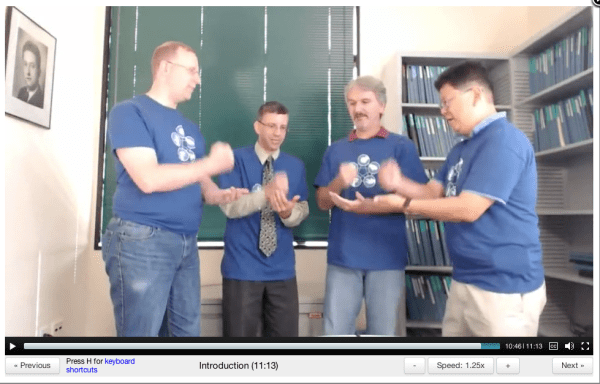
This Coursera stuff is dangerous. I’ve been loving my social network analysis class so much that when the teachers mentioned a Python class just started (and Python is a useful tool for getting data off the web and into a form you can analyse/visualise) I um, sort of signed up even though I already have way too much to do. You see, I know digital culture in and out but have never really learnt the programming that I would like to. Other than BASIC. I teach BASIC 🙂
I have to say, the Python professors are pretty cute, and totally playing on the stereotypes of comp. sci. geeks with their matching t-shirts and rock, paper, scissors, lizard, Spock games. We’re going to program that for our first week’s assignment. They’ve built a browser-based programming environment for us to practice our Python in, too, which sounds as though it’ll make things easy. One of my favourite thing about Lada Adamic‘s Social Network Analysis class is the NetLogo models you tinker with to simulate and understand each concept that’s presented in the videos.

When I first heard about MOOCs I thought they would be bad replicas of an out-dated teaching paradigm, where the teacher pours knowledge into a video, the student watches the video and then knows (or not), and knowledge is tested in brainless multiple choice quizzes. Instead I’m seeing wonderful hands-on models to play with throughout the video lectures, lots of fellow students in discussions in the forums and homework that involves actually doing something, whether it’s reading a complex sociology paper to figure out the answer to a tricky quiz question or modelling your Facebook network and uploading it for an automatic grader to check whether you could tell the size of its giant component.
I followed a little bit of MOOC MOOC, the MOOC on MOOCs that Hybrid Pedagogy ran in August. It was full of skeptics and most of the people I talked with (including me) had never actually tried a MOOC. Some of the assignments were really interesting, like write a collaborative 1000 word essay on “What is a MOOC? What does it do, and what does it not do?” with 50 other people in a single Google Doc. It was so annoying how people kept rewriting my wonderful insights 🙂
I don’t know where MOOCs will take academia and our current system of universities. Obviously all these universities offering free courses on Coursera are going to want to earn money from them at some point. A likely source of income is allowing students to pay take an exam after completing a course and getting some form of accreditation. A greater worry, I suppose, is the possibility that once a course is canned, we might not really need the professors much longer. Or at least, we might not need as many professors or as many universities. I think at least as likely a scenario is that more and more people are going to want to learn more. I wouldn’t have signed up for a university course on Python, so for me the alternative to taking a Coursera class for free is either not learning Python or teaching myself from books and the internet. I imagine most of the other students are not taking these classes instead of going to university.
Professors tend to get defensive about MOOCs, as Mark Guzdial wrote in his Computing Education Blog:
I’m damn sure that there is no MOOC that can replace what is going on in my classrooms this summer. Now, society can decide that what I’m offering isn’t worthwhile, or is too expensive, or can be offered to too few students, or may even not as work as well as I hope. Maybe that’s the real danger of MOOCs — it offers something for free (to the students) that seems as good as what a good University education could be, or as good an education as members of our society need.
Obviously a MOOC provides far less of the facilitated classroom discussions that we have with our undergraduates in my program, and it’s nowhere near offering the kind of close mentoring of MA students that I just came from this morning, where I spent two hours discussing two students’ thesis projects with them. MOOCs can’t provide individual feedback on writing, and the massive peer-review feedback some courses do is not generally very enthusiastic or informed from what I’ve read (I haven’t tried these assignments yet). But there are lots of kinds of learning a MOOC can support. So let’s see what they are good for.
I do find myself imagining setting up a Coursera course of my own. That would be a lot of fun, given the time and support to do so. It would be really interesting to do a test case. Maybe set up one of our big undergraduate classes as a MOOC and hopefully recruit lots of students from everywhere. Then run the same course with our local students. Maybe without lectures, but adding in tutorials and better feedback. And then seeing what the end results were for both groups of students.
And next spring I’m learning guitar. Finally.
Related
Discover more from Jill Walker Rettberg
Subscribe to get the latest posts sent to your email.
